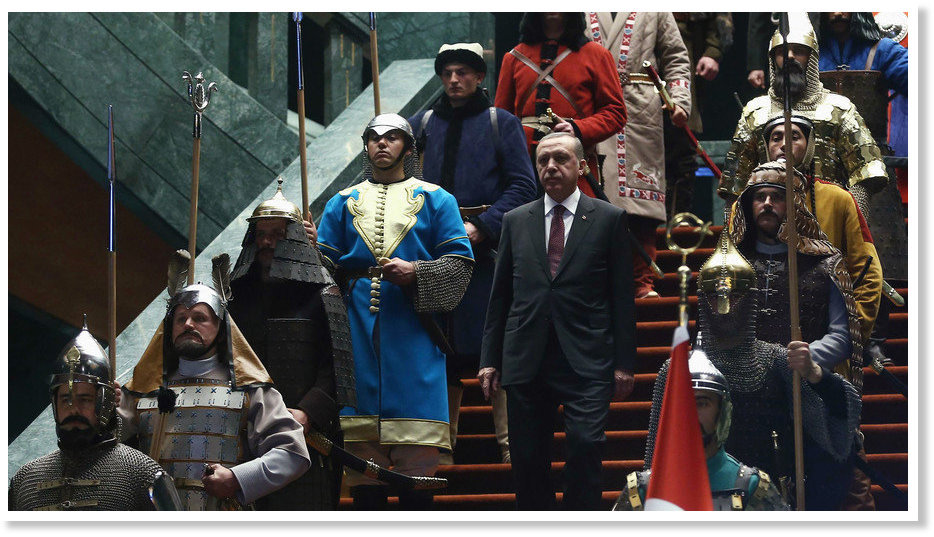
Erdogan Desires Neo-Ottoman Empire from Syria to Iraq
TEHRAN (Basirat)- it seems that the Turkish government has not learned its lessons from intervening in Syria and this time intends, more than any time before, to throw the borders of the Middle East into turmoil and insecurity through playing a destructive role in Iraq.

it seems that the Turkish government has not learned its lessons from intervening in Syria and this time intends, more than any time before, to throw the borders of the Middle East into turmoil and insecurity through playing a destructive role in Iraq.
By Dr. Shuaib Bahman
Turkey’s policy towards Iraq and President Recep Tayyib Erdogan’s harsh stances on Mosul and the Arab country’s political officials represent another aspect of Ankara’s desire for neo-ottoman foreign policy. A policy which once was implemented on Syria and brought about negative consequences for Ankara. However, it seems that the Turkish government has not learned its lessons from intervening in Syria and this time intends, more than any time before, to throw the borders of the Middle East into turmoil and insecurity through playing a destructive role in Iraq. As a result of Turkey’s strategic mistakes, Syria was turned from a peaceful and friendly country into a haven for terrorist groups. Now Ankara is interfering in Iraq’s affairs based on false claims. Two allegations have made Ankara adopt such a policy toward Iraq:
Firstly, Turkey has resented separation of Mosul from its soil since the collapse of the Ottoman Empire and has always claimed the Iraqi city as Turkish soil. Therefore, Erdogan thinks that now time is ripe and he can seize the opportunity to increase Ankara’s influence in the Iraqi area.
Secondly, Turkey does not want to lose its influence over Mosul, which has a large ethnic Turkmen population, most of whom are Sunni. Ankara has claimed that Iraq’s major operation for liberating Mosul from the Daesh terrorists will make a forceful change in the demographic composition of the region. This shows that the Turkish government wants to make an instrumental use of Sunnis and ethnic minorities in order to serve its own interests in the region.
The long-awaited battle for Mosul is underway with the participation of the Iraqi army, Kurdish Peshmarga forces, Hashed al-Sha’abi forces (Shia volunteers), Hashed al-Watani (Sunni volunteers), and Christian troops. This is while that Ankara believes the final battle is being led merely by Shias in an attempt to change the demographic composition of the region, claiming that the Iraqi army and Hashed al-Sha’abi should not participate in the offensive. In fact, Erdogan insists that only the US-led international coalition, the Turkish army and Mosul’s Sunni forces have the right to liberate the militant-held city. The Turkish president claims that participation of Hashed al-Sha’abi forces in the battle would trigger a major conflict between Shias and Sunnis, and, based on this unfounded claim, gives this right to itself more than Iraqi troops to decide about another country’s domestic issues. Not only is this interference in domestic and political affairs of Iraq, but also violates international laws.
At the same time, it is important to be noted that Mosul fell into the hands of Daesh in the summer of 2014, but since then Turkey has not taken any effective measure to release it. This is while that if Turkey was seriously resolved to fight the terrorist group, it should have acted against it two years ago.
This shows that Turkey is not determined to wage a genuine and serious war against Takfiri terrorists, and that, in fact, it is seeking to use them for advancing its owns interests by interfering in other countries’ affairs. Illegal presence of Turkish forces on the territory of Iraq near the city of Mosul and Ankara’s insistence on the necessity for Turkish involvement in the battle show that it is pursuing wrong policies towards Iraq as it did on Syria. This approach proves that Ankara is seeking to revive its neo-Ottoman policies in the Middle East, using every tool at its disposal to that end.















